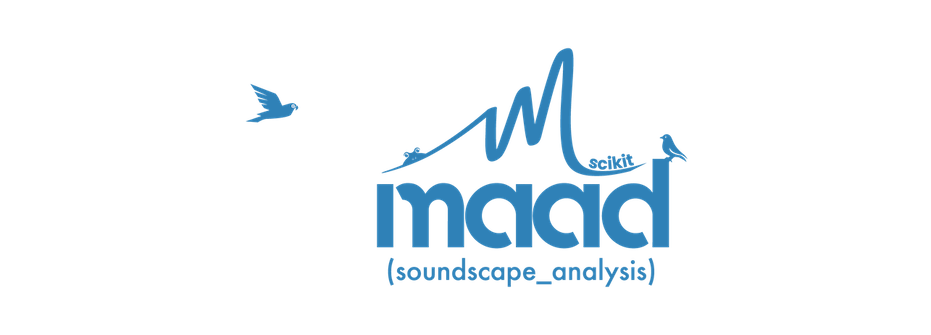scikit-maad is an open source Python package dedicated to the quantitative analysis of environmental audio recordings. This package was designed to
- load and process digital audio,
- segment and find regions of interest,
- compute acoustic features, and
- estimate sound pressure level.
This workflow opens the possibility to scan large audio datasets and use powerful machine learning techniques, allowing to measure acoustic properties and identify key patterns in all kinds of soundscapes.
scikit-maad supports these operating systems:
- Linux (tested on Ubuntu in CI)
- macOS (Intel CPUs only; Apple Silicon not supported)
- Windows
scikit-maad requires one of these interpreters:
- Python >= 3.8 < 3.11
scikit-maad requires these Python packages to run:
- matplotlib >=3.6
- numpy >= 1.21
- pandas >= 1.5
- resampy >= 0.4
- scikit-image >= 0.19
- scipy >= 1.8
scikit-maad is hosted on PyPI. The easiest way to install the package is using pip the standard package installer for Python:
$ pip install scikit-maadThe package is imported as maad. To use scikit-maad tools, audio must be loaded as a numpy array. The function maad.sound.load is a simple and effective way to load audio from disk. For example, download the spinetail audio example to your working directory. You can load it and then apply any analysis to find regions of interest or characterize your audio signals:
from maad import sound, rois
s, fs = sound.load('spinetail.wav')
rois.find_rois_cwt(s, fs, flims=(4500,8000), tlen=2, th=0, display=True)If you are interested in developing new features for scikit-maad or working with the latest version, clone and install it:
$ git clone https://github.com/scikit-maad/scikit-maad.git
$ cd scikit-maad
$ pip install --editable .Install the test requirements:
$ pip install pytestAnd run the tests:
$ cd scikit-maad
$ pytest- See https://scikit-maad.github.io for a complete reference manual and example gallery.
Runnin all examples requires to install the following packages :
-
scikit-learn, a popular Python package for machine learning: link -
librosa, a popular package for audio and music analysis: link -
tqdm, a package that provides a fast, extensible progress bar for loops and other iterable tasks: link -
In depth information related to the Multiresolution Analysis of Acoustic Diversity implemented in scikit-maad was published in: Ulloa, J. S., Aubin, T., Llusia, D., Bouveyron, C., & Sueur, J. (2018). Estimating animal acoustic diversity in tropical environments using unsupervised multiresolution analysis. Ecological Indicators, 90, 346–355
If you find scikit-maad usefull for your research, please consider citing it as:
- Ulloa, J. S., Haupert, S., Latorre, J. F., Aubin, T., & Sueur, J. (2021). scikit‐maad: An open‐source and modular toolbox for quantitative soundscape analysis in Python. Methods in Ecology and Evolution, 2041-210X.13711. https://doi.org/10.1111/2041-210X.13711
or use our citing file for custom citation formats.
Improvements and new features are greatly appreciated. If you would like to contribute submitting issues, developing new features or making improvements to scikit-maad, please refer to our contributors guide.
To create a positive social atmosphere for our community, we ask contributors to adopt and enforce our code of conduct.
In 2018, we began to translate a set of audio processing functions from Matlab to an open-source programming language, namely, Python. These functions provided the necessary tools to replicate the Multiresolution Analysis of Acoustic Diversity (MAAD), a method to estimate animal acoustic diversity using unsupervised learning (Ulloa et al., 2018). We soon realized that Python provided a suitable environment to extend these core functions and to develop a flexible toolbox for our research. During the past few years, we added over 50 acoustic indices, plus a module to estimate the sound pressure level of audio events. Furthermore, we updated, organized, and fully documented the code to make this development accessible to a much wider audience. This work was initiated by Juan Sebastian Ulloa, supervised by Jérôme Sueur and Thierry Aubin at the Muséum National d'Histoire Naturelle and the Université Paris Saclay respectively. Python functions have been added by Sylvain Haupert, Juan Felipe Latorre (Universidad Nacional de Colombia) and Juan Sebastián Ulloa (Instituto de Investigación de Recursos Biológicos Alexander von Humboldt). For an updated list of collaborators, check the contributors list.
To support reproducible research, the package is released under the BSD open-source licence, which allows unrestricted redistribution for commercial and private use.



